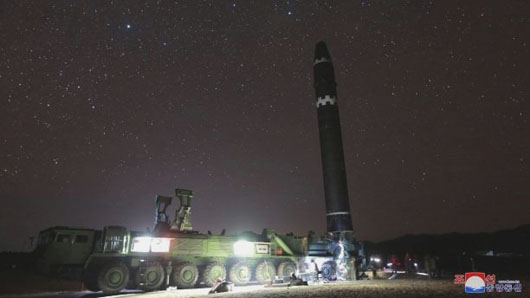by WorldTribune Staff, November 30, 2017
U.S. President Donald Trump called on Chinese President Xi Jinping to halt China’s supply of oil to North Korea following Pyongyang’s latest test of an intercontinental ballistic missile (ICBM).
“President Trump called Chinese President Xi this morning and told him we have come to the point that China must cut off its oil from North Korea,” U.S. Ambassador to the UN Nikki Haley said during an emergency meeting of the UN Security Council on Nov. 29. “That will be a pivotal step in the world efforts to stop this international pariah.”

“Through sanctions, we have cut off 90 percent of North Korean trade and 30 percent of its oil, but the crude oil remains. The major supplier of that oil is China,” Haley said.
Haley noted that after China briefly severed its oil supply in 2003, North Korea came to the negotiating table.
“Many countries made some big economic and political sacrifices by cutting ties with North Korea. They did that to serve the peace and security (of the world). … We now turn to President Xi to also take that stance,” Haley said.
North Korea’ proclaimed that its latest ICBM, the Hwasong-15, could reach anywhere in the U.S.
Referring to North Korea’s declaration of its completion of “state nuclear force,” Haley noted that “the North Korean regime misses something very important.”
“Being a nuclear power comes with certain standards. It comes with being responsible enough to know that you don’t threaten other countries with nuclear weapons. You don’t starve your own people in order to fund nuclear weapons. You don’t bully or play games with nuclear weapons,” Haley said. “(But) the regime has shown time and again that it doesn’t want to talk.”
Russian Ambassador Vassily Nebenzya called on Pyongyang to stop its nuclear and missile tests and also urged the U.S. and South Korea to suspend their joint military exercises in December in return. Russia also cited U.S. bomber flights near North Korean territory as a provocation.
“Over the past two and a half months the United States and its allies seem to have tried the patience of Pyongyang with its activities including its unplanned and undeclared military maneuvers and recently introducing unilateral sanctions,” Nebenzya said. “Against the backdrop of the calm and quiet by Pyongyang of these hostile moves against [North Korea] forces us to think about the sincerity of the statements by Washington about its preference for peaceful means for resolving the crisis.”
China’s Deputy UN Ambassador Wu Haitao blamed the U.S. for ignoring a joint Sino-Russian “suspension-for-suspension” proposal, wherein the U.S. would suspend the joint military exercises with South Korea in exchange for a halt in North Korea’s missile testing.
“China proposed the dual-track approach of promoting parallel progress in denuclearization,” Wu said, without acknowledging the U.S. oil cut-off proposal. “When the parties adopted a tough stance and misjudged each other, the chances for peace passed by.”
Subscribe to Geostrategy-Direct __________ Support Free Press Foundation
